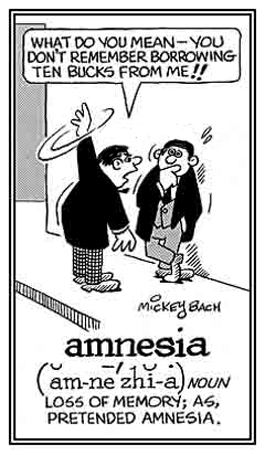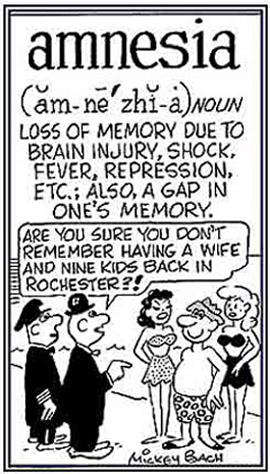a-, an-
(Greek: prefix; no, absence of, without, lack of; not)
These prefixes are normally used with elements of Greek origin, a- is used before consonants and an- is used before vowels.
It affects the meanings of hundreds of words.
There are too many words that use these prefix elements to list all of them on this site; however, there are significant examples listed in this and the other units where they exist.
In addition to the previous applicable terms for the word alexia, research has also provided us with "optical alexia", "sensory alexia", and "visual alexia"; however, it is not the same as "motor alexia" (anarthria), in which there is a loss of the power to read out loud although the significance of what is written or printed may be understood.
2. A disorder in reading ability: Alexia is differentiated from dyslexia, which is a developmental problem in reading.Strictly speaking, lexus and its derivatives refer to speech, not reading, because they are based on the Greek verb legein, "to speak", and not on the Latin verb legere, "to read". Current usage of alexia appears to reflect an etymological error that has been accepted for so long that to insist on correcting it might be useless.
2. A deficiency in speech that commonly occurs in schizophrenia: Alogias may result from perceptions of those who become detached, isolated, and remote from reality and from the rest of society.
2. Etymology: derived from Greek mythology, a female warrior "without a breast" because of the story that the Amazon women, warriors of Scythia, Greece, were said to cut off (or burn off) one breast to make it easier to use a bow when shooting arrows during a battle.
The Greek fable illustrates the word Amazon that comes from a-, "without" and mazos, "breast".
See this fictional and humorous origin of Amazon on the internet by going to this page.

Go to this Word A Day Revisited Index
so you can see more of Mickey Bach's cartoons.
2. Something especially delicious to taste or smell: Nadine always thought her mother's baked cakes smelled and tasted like ambrosia.
3. A fruit dessert made of oranges and shredded coconut and sometimes pineapple: The recipe for ambrosia did not specify the exact amounts of each ingredient.
4. Etymology: borrowed perhaps through Middle French ambroysie, or directly from Latin ambrosia, from Greek ambrosia, feminine of ambrosios of the immortals; that is, gods, from ambrotos, "immortal" (a-, "not" + Greek brotos, "mortal" [from earlier mrotos] + -ia, a suffix that forms nouns).
Normally, amenorrhea ends naturally in middle age with the beginning of menopause (time when a woman's ovaries and the lining of the uterus prepare an egg for fertilization).
A disorder of language that is known as amimia is characterized by a person not being able to express ideas by nonverbal communication; such as, making gestures or understanding what gestures mean.
Amnesias may exist for some people because of shocks, psychological disturbances, brain injuries, certain kinds of illnesses, or just old age.




